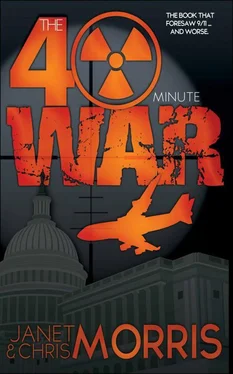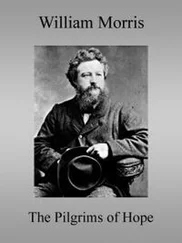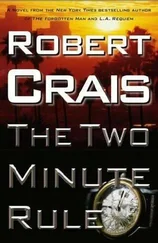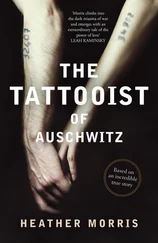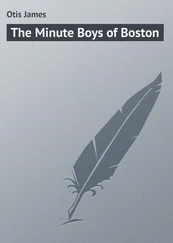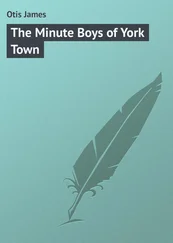“I need to see for myself, Sam. It won’t take long.” He’d said the same thing to so many distraught foreign nationals during his Mediterranean tours that the sense of déjà vu he experienced was comforting.
He’d gotten through at least a dozen scenes like this—earthquakes in Turkey, revolutions in Iran, camps on the Pakistan-Afghanistan border—that he knew he could get through this one. It wasn’t part of his mission, after all, just a prelude to clear his mind and put things in perspective.
“You’re certain? It’s going to be rough; Muffy wouldn’t want you to risk your health; we’ve got to live for them, not die for…” Nye broke off.
Beck wondered how to explain. He didn’t feel the need to exhume his family’s corpses and hold them in his arms; he’d never been the type who got relief or absolution from funerals. When he had to go to them, he tried to avoid open caskets. Dead was forever and it didn’t look anything like life on the bodies it claimed. Consonant with his world-view, he preferred his last memories of people he loved to be memories of them filled with life, not empty in death.
And yet there was a chance, vanishingly small, that someone—his kids, Nye’s kids, his wife, Nye’s wife—had survived: if they’d been in the cellar of Nye’s solid brick home, it was barely possible. That was all he wanted to know—that he wasn’t snuffing out a dim spark of life in order to save himself some grief. Once he’d seen that survival wasn’t possible in Georgetown, he could leave for Langley.
He said only: “You’re welcome to stay here with the chopper, Sam. I won’t take offense and somebody probably should keep Thoreau company.”
Through the double-thick, darkened glass of the Black Hawk’s windscreen Beck could see jumbled wreckage as Thoreau put them down in the center of a street littered with cars and twisted hulks of metal much less recognizable.
There was a snap-pop as Ashmead and Slick reentered the com circuit: “Okay, Beck,” Ashmead told him, “let’s go ruin your day.”
The Black Hawk’s rotors slowed but did not stop; its powerful engines idled: Thoreau wasn’t taking any chances that a mechanical failure would trap them here.
Slick unbuckled his harness and came aft to get shovels while Ashmead slid back the door: “Let’s go, ghouls.”
Thoreau’s voice crackled in his ears as Beck hopped down onto the greasy, cracked pavement: “Good luck, Casper; hope you find what you’re looking for.” The tone, more expressive than Thoreau’s flip words, said: Us family men have got to stick together .
“Thanks, Thoreau, we won’t be long.”
However long they’d be, they wouldn’t be without recourse: along with shovels and pickaxes, Slick distributed Ingram M-10s with folding butt stocks and full thirty-round clips, demonstrating their use deftly: “Just in case, okay?”
Sam Nye looked at the weapon in his hand with distaste and gave it back to Slick: “I’d probably shoot my foot off.”
“Bugger all, Rafic,” Beck heard Slick mutter, “if he could fly we could leave him here and bring Thoreau.”
“But he can’t,” Ashmead said as Beck rotated the cocking handle of the bolt through ninety degrees to safe the weapon and hung it over his shoulder by its web strap as Ashmead had long ago taught him.
Perhaps it was the shouldered weapon, but Beck began to perspire so that salty drops ran into his eyes and the sides of his viewplate began to fog.
Slick, weapon at his hip, waved them forward, a map in one gloved hand; Nye paced Beck and Ashmead fell in behind them with a deep sigh that said Nye wasn’t playing by Ashmead’s rules.
But it was Sam who recognized the house—or what was left of it, among the ruins gleaming in the spring sunlight.
Above, the sky was “high,” as pilots say, blue and cloudless, giving every shattered brick and downed telephone pole and shard of glass a hard, unnatural edge.
The pile of rubble that had been Nye’s home of brick and finely fretted white woodwork was blackened and tumbled as if a giant’s hand had swept it aside in a fit of pique. Not one wall stood higher than Beck’s calf and two chimney stumps rose like amputated limbs from either side.
Support beams had fallen and floors were compacted upon one another.
Slick said needlessly: “This be it, gentlemen. I swore an oath never to step on anything looking remotely like that, and you should too: if what’s left of that ground floor gives way, we’ll never dig you out in time for you to thank us.” But even as he spoke, Slick was unwinding coils of black nylon rope from around his waist.
They were standing on what had been the walkway. Beck could see a hole that had once been a basement window—just a darker shadow among the tumbled beams.
Ashmead came up to him and put a hand on his shoulder: “Talk to me, Beck. Quiet isn’t good at a time like this.” An uplifted palm stayed Slick’s offer of a safety line. “You don’t have to prove anything. You’re here; there’s not a sign of life. If you were one of mine, I’d order you back to the Black Hawk about now.”
Sam Nye said suddenly: “Did you see that?”
“See fucking what?” Slick demanded curtly.
“The basement window—I could swear something moved.”
“Rubble settles,” Ashmead said to Nye. “Well, Beck?”
“I’ll just… look in the window,” Beck heard himself reply. He was telling himself he could see something in there—a gleam, a glow of eyewhites—something worth keeping the rest of them at risk. His heart was pounding like the Black Hawk’s composite rotor blades as they cut the air.
Slick tossed him the rope and Beck, feeling foolish, hooked it to the safety harness at his waist.
Nye said: “I’m coming with you.”
Beck shrugged.
Slick said: “Hold onto his line, then, fella—two heroes is more than I was prepared for.”
Ashmead slapped the buttstock of his Ingram so that it unfolded and nestled the weapon, muzzle heavenward, in the crook of his arm. Then he gestured with it: “Gentlemen, be our guests.”
Beck was already moving, not up the crazed walkway, but across the littered yard with Nye beside him.
When he stepped carefully over something and Nye gulped in a sharp breath as if he’d been struck, Beck realized that it was the handlebars of a tricycle.
He remembered asking Nye, back in Dugout, if this trip was just to collect the ashes.
Moments later, he was down on his knees and wishing that ashes were all there was to collect.
In the imploded window’s frame was a hand. It was impossible to tell if an arm was still attached to it because it disappeared into blackness and the hand itself was blackened. In places charred bones showed through crispy skin, not white bones, but gray-brown like those of a well-cooked chicken.
On the hand’s third finger was a single ring, a square-cut two-carat ruby that Beck had given Muffy because he’d not wanted a double-ring ceremony and the very idea of wedding bands distressed him. It was from Harry Winston’s and there certainly wasn’t another like it on this street in Georgetown.
He was on his knees, peering at it, unwilling to touch the dried and wizened finger for fear it would come off in his hand and he’d vomit all over himself inside the radiation helmet.
He just knelt there, his palms pressed against his knees, conscious that Nye, beside him, was breathing heavily.
After a time, Ashmead snapped: “What the fuck’s going on over there?”
“I… found her.”
“Damned convenient,” Slick said. “You’re sure?” And then, to Ashmead: “Here, hold the rope. If I don’t get them out of there, they’ll sit there till sundown.”
He felt rather than heard Slick’s footsteps and when he could see the toe of Slick’s combat boot he reached out to take his wife’s ring, eyes slitted almost closed.
Читать дальше
